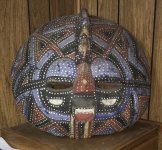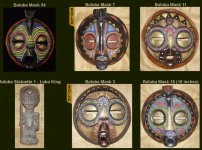SnakemanBill
Sr. Member
- Apr 24, 2008
- 408
- 233
- Detector(s) used
- Tesoro Tiger Shark
- Primary Interest:
- All Treasure Hunting
Greetings!
ive had this mask that I bought at a yard sale a few years ago. I think it’s West Africans but I’m not positive about that. Are there any mask experts here that can enlighten me? It’s about 19 inches wide and 18 inches high.

ive had this mask that I bought at a yard sale a few years ago. I think it’s West Africans but I’m not positive about that. Are there any mask experts here that can enlighten me? It’s about 19 inches wide and 18 inches high.
Attachments
Last edited:




